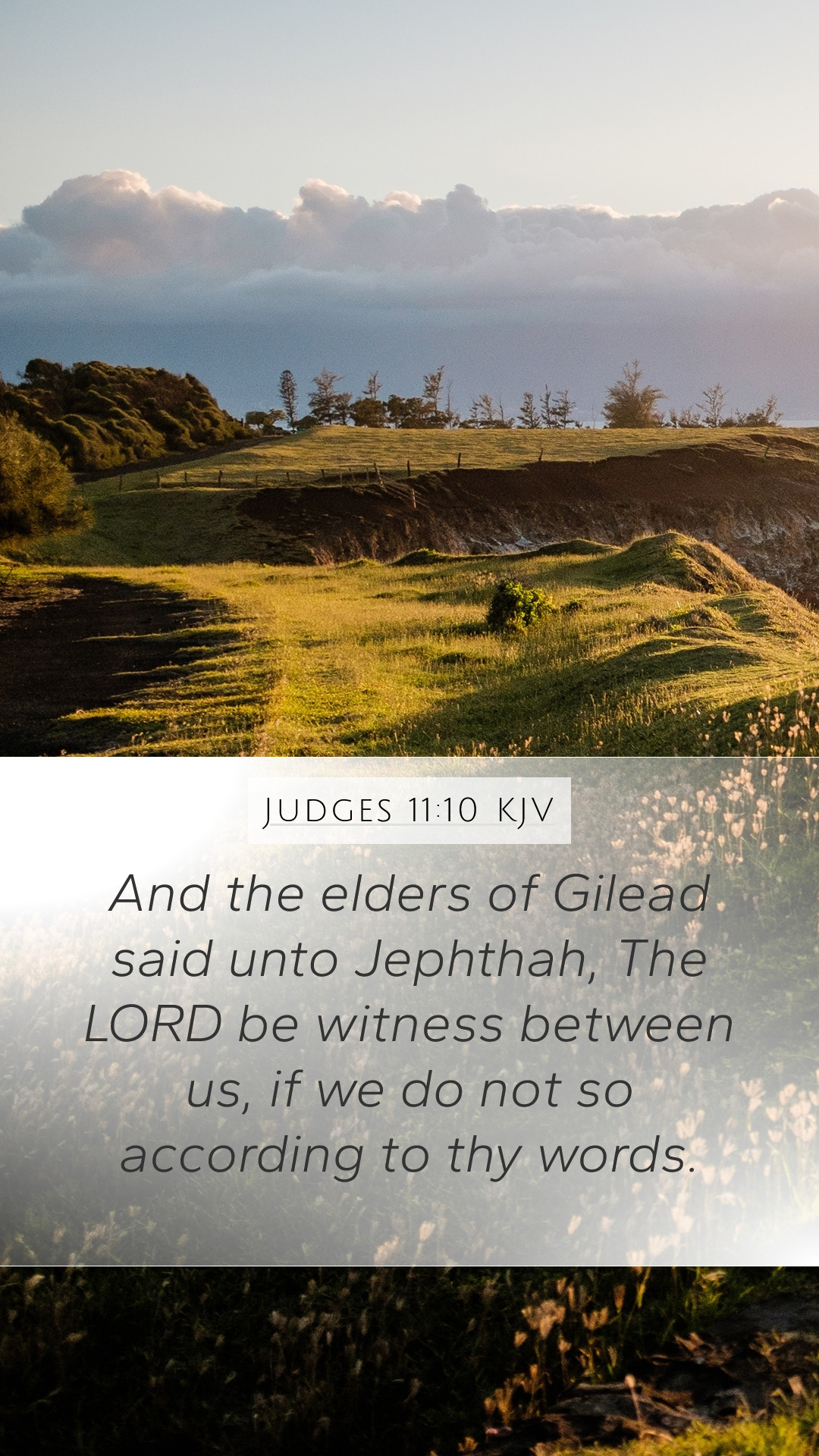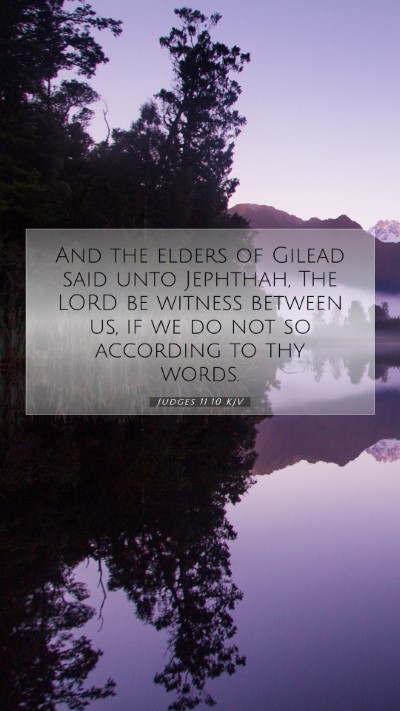Understanding Judges 11:10
The verse of Judges 11:10 holds significant meaning and is often examined in bible study groups for its contextual implications. This passage provides a window into the relationship between Israel and God during the time of the judges, reflecting critical elements of Bible verse interpretations.
Verse Text
"And the elders of Gilead said unto Jephthah, The LORD be witness between us, if we do not so according to thy words." (Judges 11:10, KJV)
Historical and Contextual Background
This verse takes place during a tumultuous period for Israel when they were constantly in conflict with surrounding nations. Jephthah, a warrior and offspring of a harlot, was chosen to lead Israel in combat against the Ammonites. The elders of Gilead sought to affirm their commitment to Jephthah’s leadership, invoking the name of the Lord as a witness to their promise.
- Judges 11:1-11: This passage sets the scene for Jephthah’s rise and the elders’ decision.
- 1 Samuel 12:5: Here, we see a parallel acknowledgment of the importance of oaths and divine witness.
- Hebrews 6:16: This verse emphasizes the seriousness of making oaths and vows with God as witness.
Commentary Insights
Insights drawn from public domain commentaries enrich our Bible verse understanding:
Matthew Henry's Commentary
Matthew Henry reflects on the sincerity of the elders of Gilead. He notes that their invocation of the Lord as witness demonstrates a solemn commitment. In a time when integrity was paramount, this act highlighted the seriousness of their pledge to follow Jephthah’s leadership. He points out the broader implications: that God’s involvement is crucial in any binding agreement.
Albert Barnes' Commentary
Albert Barnes emphasizes the legal and moral weight of the elders’ statement. By requesting God to act as a witness, they are acknowledging His sovereignty over their actions. This underscores a foundational principle in biblical teachings: that any undertaking should be done with divine accountability in mind. Their promise to follow Jephthah's command is both a personal and communal commitment to uphold God’s will.
Adam Clarke's Commentary
Adam Clarke adds a perspective on Jephthah’s character. He points out that despite Jephthah’s lineage, which societal norms might overlook, he became a leader because of his valor. The elders recognize his leadership abilities and are willing to bind themselves to his authority under God’s witness, reflecting the tension of divine purpose against human judgment.
Theological Reflections
Judges 11:10 thus encapsulates essential Bible study insights about commitment and divine oversight in human decisions. The elders, recognizing the authority of God, pledge their fidelity to Jephthah, which illustrates broader themes of leadership, accountability, and faith:
- Accountability to God: Their request for divine witness serves as a reminder that all human agreements are ultimately under God's jurisdiction.
- Role of Leadership: The choice of Jephthah illustrates how God can raise leaders from unexpected places, emphasizing that valor and divine selection prevail over societal norms.
- The Nature of Vows: The seriousness with which oaths are considered is a recurring theme throughout Scripture, inviting readers to reflect on their own commitments.
Applying Judges 11:10 in Daily Life
Understanding the significance of this verse can enhance how one approaches personal commitments and leadership roles:
- Consider the weight of your promises: Just as the elders of Gilead pledged their commitment with God as a witness, we should recognize the importance of upholding promises in our lives.
- Seek God’s guidance in leadership: Whether in informal settings or official capacities, realizing that God appoints leaders reminds us to seek His counsel.
- Evaluate who you follow: Just as the elders chose Jephthah, we must assess who we allow to lead us, ensuring they align with Godly principles.
Related Bible Verses
For further Bible verse commentary and understanding, consider the following related verses:
- Judges 11:1 - The backstory of Jephthah.
- 1 Samuel 8:4-5 - Israel's demand for a king, showcasing leadership dynamics.
- Ecclesiastes 5:4-5 - The gravity of making vows.
Conclusion
Judges 11:10 serves as a profound example of the intricacies of human relationships under divine sovereignty. It invites us into a deeper understanding of Scripture that transcends mere historical accounts, allowing us to apply its teachings in contemporary contexts. The careful examination of this verse, alongside the insightful contributions from biblical scholars, enriches our journey into Biblical exegesis and understanding.


